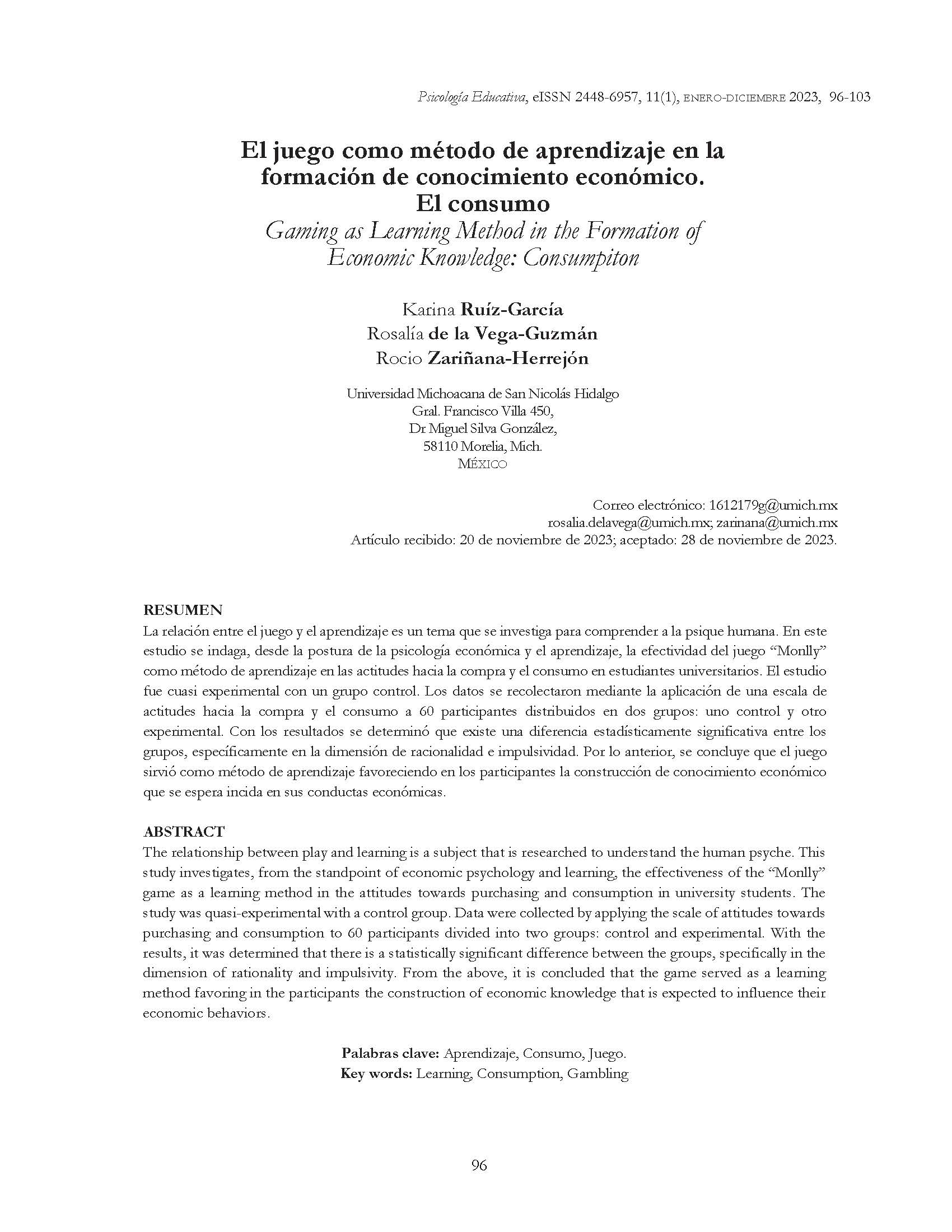Abstract
The relationship between play and learning is a subject that is researched to understand the human psyche. This study investigates, from the standpoint of economic psychology and learning, the effectiveness of the “Monlly” game as a learning method in the attitudes towards purchasing and consumption in university students. The study was quasi-experimental with a control group. Data were collected by applying the scale of attitudes towards purchasing and consumption to 60 participants divided into two groups: control and experimental. With the results, it was determined that there is a statistically significant difference between the groups, specifically in the dimension of rationality and impulsivity. From the above, it is concluded that the game served as a learning method favoring in the participants the construction of economic knowledge that is expected to influence their economic behaviors.
References
Amar, J. Abello, R. & Tirado, D. (2004). Desarrollo infantil y construcción del mundo social. Universidad del norte.
Amar, J. & Martínez, M. (2011). Los fundamentos económicos en la comprensión del mundo social en la infancia. Revista de Economía del Caribe, (8), 232-254. https://dialnet.unirioja.es/servlet/articulo?codigo=6143260
Ausin Azofra, J. (2021). La neurociencia como instrumento para medir la eficacia de la publicidad en medios audiovisuales. [Tesis doctoral, Universidad Politécnica de Valencia]. RiuNet. http://hdl.handle.net/10251/180237
Denegri, M., del Valle, C., Gempp, R., & Arzola, M. (2006). Educación económica en la escuela: hacia una propuesta de intervención. Estudios pedagógicos (Valdivia), 32(2), 103-120.
Denegri, M., González, J., & Sepúlveda, J. (2010). Consumo y Construcción de Identidad en Profesores de Educación Primaria en Chile. EDUCERE 14 (49), 345-359. Recuperado de: http://www.redalyc.org/articulo.oa?id=35617102010
Denegrí, M, Del Valle, C., González, Y., Etchebar-ne, S., Sepúlveda, J. & Sandoval, D. (2014). Consumidores ou cidadãos?: Uma proposta de inclusão da educação financeira e econômica na formaço inicial de professores. Estudios pedagógicos (Valdivia), 40(1), 75-96. https://dx.doi.org/10.4067/S0718-07052014000100005
Denegri, M., Araneda, K., Ceppi, P., Olave, N., Olivares, P. & Sepúlveda, J. (2016). Alfabetización económica y actitudes hacia la compra en universitarios posterior a un programa de educación económica. Revista de Estudios y Experiencias en Educación 15(29), 65 – 81. doi: 10.21703/rexe.20162965814
ENIGH. (26 de julio de 2023). Encuesta Nacional de Ingreso y Gasto en el Hogar 2022. ENIGH https://www.inegi.org.mx/contenidos/programas/enigh/nc/2022/doc/enigh2022_ns_presentacion_resultados.pdf
Galván, M. (07 de enero de 2022). Pandemia ha cambiado la forma de ahorrar de los mexicanos. El economista. El Economista. https://www.eleconomista.com.mx/finanzaspersonales/Pandemia-ha-cambiado-la-forma-de-ahorrar-de-los-mexicanos-20220106-0062.html
Gallardo-Lopez,J., Lázaro, I. & Vázquez, P. (2015). Análisis de las principales teorías del juego en el ámbito educativo. Brazilian Journal of Development, 5(8), 12172-12186.
Garófano, V., Conde, J. & Conde, J. (2002). El juego como vehículo para la adquisición de los aprendizajes. Tavira: Revista electrónica de formación de profesorado en comunicación lingüística y literaria, (18), 91-106.
Instituto Nacional de Estadística y Geografía (2020). Certificado de clases sociales por ingreso en México, 2018. Ciudad de México: INEGI
Keynes, J. (1936). The General Theory of Employment, Interest and Money. Nueva York: Harcourt and Brace.
López, M., Espinoza, A., Rojo, D., Flores, K. & Rojas, A. (2014). Hábitos de consumo del estudiante universitario. El caso del Centro Universitario del Sur, de la Universidad de Guadalajara. Nova scientia, 7(13), 352-373. https://www.scielo.org.mx/pdf/ns/v7n13/v7n13a19.pdf
Orús, A. (17 de abril de 2023). Comercio electrónico en el mundo-Datos estadísticos. Statista. https://es.statista.com/temas/9072/comercio-electronico-en-el-mundo/#topicOverview
Pozo, J. (2014). Psicología del aprendizaje humano. Ediciones Morata
Ros, J. (2012). La Teoría General de Keynes y la macroeconomía moderna. Investigación económica, 71(279), 19-37. https://dialnet.unirioja.es/servlet/articulo?codigo=6922566
Santos, M. (03 de mayo de 2021). La infancia, el big data y la educación financiera. Red Forbes. Forbes México. https://www.forbes.com.mx/red-forbes-la-infancia-el-big-data-y-la-educacion-financiera/
Tang, T. & Luna-Arocas, R. (1999). Money profiles as related to work-related attitudes: An examination of the Money Ethic endorsement among citizens in the USA. Edición 6ta European Congress of Psychology.
UNESCO. (2013). Registro de educación, ciencia y tecnología. Ed. UNESCO.
Universidad Autónoma de México; Banamex. (2018). Los jóvenes y el consumo. Revista del Consumidor. 41(1). 22-23
https://revistadelconsumidor.profeco.gob.mx/PDF/2018/RC491-ENERO-2018.pdf
Zariñana, R. (2018). Efectividad de la alfabetización económica en la toma de decisiones, actitudes, comportamiento económico y bienestar psicológico con docentes y administrativo: Investigación experimental con tres estudios. (Tesis doctoral). Universidad Autónoma de Colima. Colima, México

This work is licensed under a Creative Commons Attribution-NonCommercial-NoDerivatives 4.0 International License.
Copyright (c) 2024 Universidad Nacional Autónoma de México


